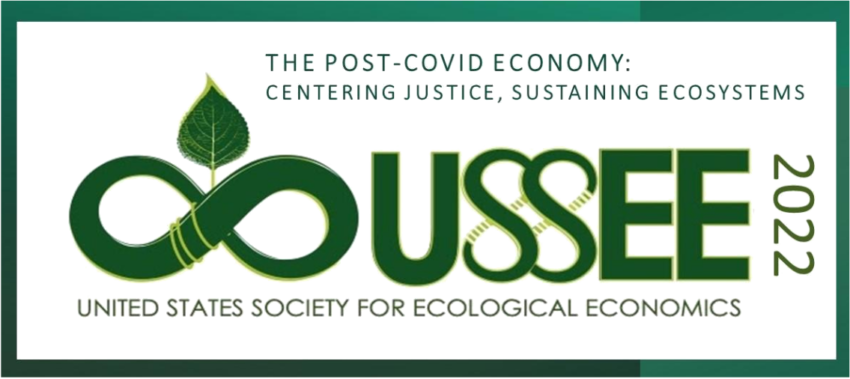
Call for Abstracts: 2022 USSEE Hybrid Conference
Abstract submission has closed. Announcements will be made in April.
The Board of the United States Society for Ecological Economics (USSEE) cordially invites you to submit an abstract for an individual poster, paper presentation, or complete session proposal to our 12th biennial conference, entitled “The Post-Covid Economy: Centering Justice, Sustaining Ecosystems”. The majority of the conference, including paper and panel presentations, will be held online, June 20-24, 2022. Some sessions and workshops may be held as hybrid in person/online events (see below). Please share this information widely with colleagues and other interested parties. Abstracts are accepted on a rolling basis.
ABSTRACTS FOR SESSIONS, PANELS, AND SYMPOSIA: Proposals for complete sessions, panels, and symposia are encouraged (no more than 90-minutes in length). We wish to provide flexibility to presenters who choose to organize a virtual session, or an in-person session at their local institution. If the session, panel or symposium is offered in person, please ensure that it will take place in a location where it may be simultaneously streamed online, to allow for both remote and local participation. A session proposal should include names, affiliations, and topics of presenters and the moderator (who may also be a presenter) and discussant(s). A panel session proposal should include a chairperson and 3-4 panelists who will comment and lead a discussion on an issue, without presenting a formal paper. A symposium can include several sessions on a specific theme, with varied format, including panels, presentations, and workshop sessions. Session organizers are responsible for organizing the sessions and panelists, and for ensuring a session abstract is submitted along with individual abstracts for each presenter.
ABSTRACTS FOR INDIVIDUAL PAPERS: Abstracts of individual papers will be considered for online parallel sessions organized around a theme or topic, and will involve individual presentations of approximately 15-20 minutes in length (including discussion). Individual presentations of co-authored papers are welcome. Presenters are asked to submit no more than two abstracts for individual papers or presentations.
ABSTRACTS FOR POSTERS: Poster abstracts will be considered for online display throughout the conference, and for an organized online poster session, in which poster authors will give a brief (3-5 minute) “speed talk” describing the topic, followed by a discussion period with conference participants in a more informal discussion format.
Abstracts (1,200 characters maximum) for sessions, individual papers, workshops, or other contributions should be submitted online via the Abstract Submission Form below.
Upon acceptance, to be announced in April, abstracts will be published to the Conference Program and available for viewing online only after the presenting author has duly registered for the conference. The deadline for conference registration will be May 1, 2022.
We extend a particular welcome to submissions of papers, posters, and session proposals related to the conference theme, “The Post-Covid Economy: Centering Justice, Sustaining Ecosystems”. Sub-themes include the following (bullet points are intended to provide examples of topics that fall under the sub-themes, not an exhaustive list):
- Education and Pedagogy
- Education in ecological economics and sustainability
- Ecosystem Services Measurement and Valuation
- Ecosystem services indicators
- Payment for environmental services (PES) programs
- Environmental Justice
- Climate justice
- Social justice
- Feminist economics
- Ecological Economics and the Built Environment
- Ecological technology and green design/green buildings
- Urban/regional planning and transportation
- Food and Agricultural Systems
- Food sovereignty
- Ecological economics of forests, fisheries and other renewable resources
- Business in Transformation
- Sustainable supply chains
- Eco-certification and ‘green’ business
- Emerging Issues in Ecological Economics
- New topics being addressed by the field
Additional thematic area symposia, short courses, panels, or workshops will be considered by the Scientific Committee, on submission of a summary described on the below Abstract Submission Form.
For further information, contact us.